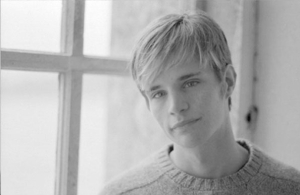Okay, I know, at this point there is something almost cliché about a gay person talking about Matthew Shepard (and if you don’t know who I’m talking about…), but I recently finished reading Judy Shepard’s book on her son’s murder and I feel compelled to speak, if only for a moment, about it.
I’m certain many of us remember the events, in October 1998, and the media frenzy Matthew’s death created. I remember it, and I was only twelve at the time. Probably because I was twelve, and I was well aware of the truth about myself and it scared me; terrified me, made me feel, understandably, vulnerable.
 I identified with this unknown boy I, or much of the world, had never met, and yet, for whom the world suddenly cared. The media made an anonymous young gay college student the unwilling martyr for hate crime. It portrayed him as this perfect angelic figure who became a victim of hate. While pieces of this portrayal are, undoubtedly, entirely true, Judy Shepard paints a different picture. She does the one thing the media was unable, or unwilling to do. She paints her son as… her son. She gives us not Matthew Shepard, the victim, but Matt Shepard, the young man she knew, her child.
I identified with this unknown boy I, or much of the world, had never met, and yet, for whom the world suddenly cared. The media made an anonymous young gay college student the unwilling martyr for hate crime. It portrayed him as this perfect angelic figure who became a victim of hate. While pieces of this portrayal are, undoubtedly, entirely true, Judy Shepard paints a different picture. She does the one thing the media was unable, or unwilling to do. She paints her son as… her son. She gives us not Matthew Shepard, the victim, but Matt Shepard, the young man she knew, her child.
She paints a life of a young person, like so many others, struggling to find his place in the world, full of hopes for his own future in a career in international relations, as he himself seems keenly gifted with interpersonal skill; she shows a man gifted in creating true friendships, with a genuine interest in those around him. Yet, along with this she shows a young man battling his own demons, after a trip away from his Swiss boarding school in Morocco saw him robbed and raped, leaving him battling depression for the rest of his life, ending his life infected with HIV, a disease he never knew he had.
Yet, mingled with his troubles we hear of macaroni and cheese eaten while riding a wooden pony while watching television when he was a child, dressing up as Dolly Parton two years running for Halloween, and an excursion in London for school clothes with his mother, among many others. (The last reverberated with me the most, understandably, as Mom and I have had a very similar experience).
Judy recounts, at several points, her growing belief, even when Matt was very young, that he would grow up to be gay, she states simply, “a mother just knows,” and a fear for his future because of it. I’m sure it’s a fear many parents of gay children have. I’m certain mine did at some point.
Repeatedly through the book Judy shares what that experience meant to her and reiterates that Matt was not her “gay son; Matt was [her] son who happened to be gay.” It’s a valuable message to hear, and important to share. For that alone I’m passing the book on to my own mother.
One repeatedly gets the sense in reading the book that she succeeds in letting us in to who her son was, by adding touches almost too personal for inclusion, and which left me feeling slightly voyeuristic, and yet grateful for their inclusion.
In reading her description of the crime itself, one is lulled for a moment into a sense of the crime novel, of, as even she describes it, watching all the puzzle pieces come together to explain the web of events that ended Matt’s life, and yet, you are constantly reminded of the author’s position, making these descriptions all the more gut wrenching , and this book never becomes anything more, or less, than a mother telling her son’s story, as it should be. She repeatedly states that she has never permitted herself to ‘go there’ in her mind with the crime itself, and this provides an appropriate distance throughout. I caught myself watching the ‘American Justice’ chronicle of the crime this morning, with that distance stripped, showing the police photographs of both the scene and Matthew, and I wish I could have Judy’s distance back. Seeing what was done to him…
While Dennis Shepard is quoted as saying his son “did not look like a winner,” in death he attracted the attention of the nation, and the world to causes close to his heart and motivated his parents, and others to act, and continue to act, on his behalf. That, I think, makes him quite the winner in the end. Over a decade after the crime that ended his life, I remember him. I never knew him, and yet, I remember him. In that, I am far from alone. His father has stated, Matthew has “become a symbol- a symbol against hate and people like [Aaron McKinney]; a symbol for encouraging respect for individuality; for appreciating that someone is different; for tolerance.”
In life, Matthew “wanted to make a difference. Did he? You tell me.”
For more information, visit The Matthew Shepard Foundation.